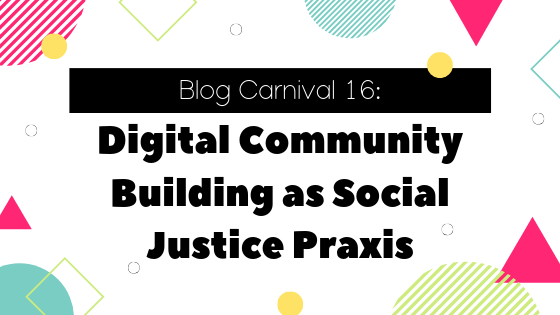Editors: Dana Comi and McKinley Green
Introduction
We are two of many scholars who recognize that networked digital technologies offer vibrant opportunities for community-building, identity formation, and coalitional activism. In this Blog Carnival, we encourage a conversation that frames community-building itself as a social justice praxis in digital spheres, inspired, in particular, by networked activism efforts around decolonial justice, intersectional feminism, queer and trans-liberation, anti-racism, and the spaces where these movements overlap and mutually inform. Duthely’s (2017) work offers a potent rhetorical approach for understanding these movements; using Black digital feminism as framework, she asserts, “as Black women work to tell digital counterstories and build community via collective memory, they engage in defiant acts…that disrupt traditional forms of knowledge-making” (p. 204). We’d like this Blog Carnival to explore similar sites of digital activism and interrogate the ongoing complexities, challenges, and evolutions that define doing digital work in order to bring about more just and equitable ways of living and relating in the world.
Specifically, how do people use digital technologies to craft communities, and how do those community-building practices intervene in unjust relations? In addition to Duthely (2017), we look to many scholars as models for this kind of work, including >Gray’s (2018) ethnographic exploration of online gaming as a space to navigate raced, gendered, and sexualized identities and create sustaining communities, Shivers-McNair, Gonzales, and Zhyvotovska’s (2019) efforts for community-based technology design and multilingual user experience, and Medina’s (2018) theorizing of testimonio, “a resistant ethos in an academic space to engage with issues of race, class, gender, and disability.” In pursuing these digital and networked efforts for justice, we also seek contributions that interrogate how offline systemic injustices permeate and shape online discourse (e.g., Noble, 2017; Sawyer, 2015; Conner, 2019) as well as contributions that take up discussions around armchair activism.
This Blog Carnival invites a conversation about digital community building in various forms: from life-giving practices of sharing common experiences to mobilizing and responding to injustices like police violence, climate change, racism, gender and sexual violence, government corruption, and/or unjust university labor conditions. This community building can create inclusive spaces that aren’t perhaps otherwise available or supported offline and can accomplish a myriad of purposes. We also recognize and hope to build a conversation around the labor these actions require to be supported and sustainable. We hope that this Blog Carnival explores some of these intricacies, introduces others, and creates a multivocal engagement with these issues and inquiries.
Key questions:
- How do we–as scholars, community members, activists, teachers–participate in or build online communities in ways that work toward social justice? And while we (the authors of this CFP) define “community” broadly to refer to groups within, outside, and across academic and nonacademic spaces, what alternative practices or definitions of ‘community’ can shape digital activism?
- How do digital rhetoricians define and practice other key terms, like social justice, reciprocity, consent, and activism?
- How does our participation and membership in offline communities contribute to our scholarship with online communities? And what practices/definitions of reciprocity emerge when we work with online communities that we are members of?
- What pedagogical approaches can promote discussions around digital communities and social justice work?
If you’re interested in contributing to this Blog Carnival, please submit your name, email, and short proposal (about 100 words) to this Google Form. We will be reviewing and accepting proposals in mid-to-late October, so please send your descriptions as soon as possible, but no later than October 26th. Full blog posts will be due by November 18th. When completed, the blog post should be about 750-1000 words, but we do have some flexibility as we’re on a digital platform. We encourage posts in a variety of forms and any medium appropriate for featuring digitally on the DRC, such as text, audio, and visual or other multimedia.
Blog Carnival Timeline
- 100-word proposals due – October 26th
- Acceptance notices – October 29th
- Blog entries due – November 18th
- Final publication – November 22nd

